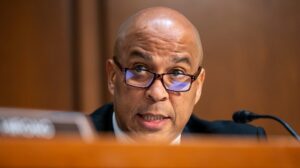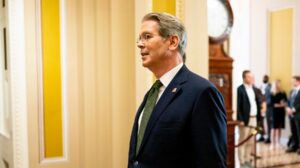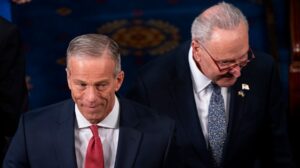Congress
Elon Musk has GOP leaders scrambling to save the megabill
Mike Johnson has spent his 19 months as speaker forging a close relationship with President Donald Trump — in part to avoid the social-media bombshells that derailed so many Republican priorities during Trump’s first term.
Now he has to deal with another, perhaps even more unpredictable online bomb-thrower.
Elon Musk’s decision to launch a sudden scorched-earth campaign against the GOP’s domestic-policy megabill has forced Johnson into a sudden scramble to save the centerpiece of the Republican legislative agenda.
Starting in the moments Tuesday after Musk first called the bill a “disgusting abomination” through the tech mogul’s open breach Thursday with Trump, the speaker has mounted a multi-front rebuttal to the criticism — aiming to keep the backlash from spinning out of control.
That has included questioning Musk’s personal motives for opposing the bill, challenging Musk’s claims (backed up by independent scorekeepers) about the bill’s fiscal impact, promising other legislative actions that will address Musk’s concerns and otherwise questioning the Tesla and SpaceX chief’s understanding of the legislative process.
“Look, I’m a fiscal hawk myself,” an exasperated Johnson told reporters Wednesday evening. “If I could cut $8 trillion in federal spending today, I would do it, but I do not have the votes for that. So, this is a deliberative body. It requires consensus. It took us over a year to reach the consensus, to get 217 votes necessary to make the cuts that we have.”
He described a “multiple step process” for securing conservative wins that includes the spending “rescissions” Republicans are now pursuing, as well the upcoming fiscal 2026 appropriations process and the prospect of “another reconciliation package” in addition to the megabill.
“There may be a third one,” Johnson floated, adding that “we have to do it in the proper sequence.”
It remains unclear just how effective Musk’s attacks will be with Republican lawmakers — especially after he openly attacked Trump, suggesting without evidence the president was implicated in wrongdoing with the late sex predator Jeffrey Epstein.
Most in the GOP enthusiastically embraced the charismatic automaker and rocketeer as he fully aligned himself last year with Trump and the GOP, and they cheered on his chaotic bureaucracy-slashing efforts in the White House.
But they also see Trump, not Musk, as their political lodestar and so far there is no sign the president is wavering on the legislation, even after Musk told his 220 million followers on X Wednesday to call their representatives and “KILL the BILL.”
Top House leaders have publicly and privately emphasized Trump’s ongoing support for the bill. Johnson said at a Wednesday news conference that Trump is “not delighted that Elon did a 180” on the legislation.
Asked about the possibility of Musk targeting House incumbents who vote for the legislation, House Majority Leader Steve Scalise pivoted to Trump’s role as “our best, most effective deliverer of support.”
GOP leaders and White House officials have also called in backup from online conservative influencers to publicly back the bill on X and other platforms amid Musk’s all-out assault, according to two people granted anonymity to describe the private conversations.
Johnson, for instance, shared a list of “50 MAJOR wins from Trump’s Big Beautiful Bill that the media is ignoring” from Turning Point USA’s Charlie Kirk on his official speaker X account alongside endorsements from top Trump aide Stephen Miller and several of his own members.
The speaker has also been willing to suggest that Musk’s criticisms aren’t entirely based in conservative principle — he noted to reporters on multiple occasions that Tesla, Musk’s electric vehicle firm, would be negatively affected by the termination of clean-energy tax credits in the megabill.
“I know that has an effect on his business and I lament that,” he said Tuesday, later adding in a Bloomberg TV interview Wednesday that the tax credits were “important to the leader of Tesla.”
Musk on Thursday took direct aim at Johnson, suggesting the speaker had betrayed his past views on deficit spending by pushing the megabill forward — to which Johnson responded: “The Mike Johnson of 2023 is the SAME Mike Johnson who has always been a lifelong fiscal hawk – who now serves as Speaker and is implementing a multi-stage plan to get our country back to fiscal responsibility and extraordinary economic growth.”
The main risk for Johnson right now is that Musk’s attacks could buoy fiscal hard-liners at a critical moment for the legislation, with the Senate poised to make significant changes that could reduce the size of the spending cuts in the House passed bill. The bill will then have to come back to the House for final passage, and Musk is only emboldening potential holdouts.
One such House hard-liner, Rep. Chip Roy of Texas, said Musk’s broadsides “wouldn’t have hurt our case about two to three weeks ago.”
Perhaps even more worrying for Republicans: Musk’s critique of the bill’s fiscal impact — adding $2.4 trillion in deficits according to a new Congressional Budget Office analysis — is opening up a new line of attack on their incumbents as they work to sell the bill to the public ahead of the 2026 midterms. They’re already under heavy fire from Democrats, who are training attack ads on the GOP’s planned Medicaid cuts.
“I don’t think he’s killing the bill,” said one House GOP lawmaker. “I’m more worried he’s killing our sales pitch.”
Rep. Richard Hudson of North Carolina, who leads the House GOP campaign arm, dismissed Musk’s threats in a brief interview Wednesday evening: “He’s been a friend and he’s just wrong about this bill,” he said. “I think long term, this is nothing.”
But privately, wary GOP incumbents are noting that Musk isn’t just another scorned administration official or outspoken MAGA Republican: He poured more than $250 million into the 2024 elections to help Trump and congressional Republicans take power. His veiled threats to target Republicans in the midterms are deeply worrying to members who can’t afford to fend off Musk’s intervention in their races — or might have been hoping he’d write them a check.
For some House Republicans, however, the public break with Musk comes as a welcome development. Many have been irritated that Musk would not take responsibility for some of the chaos his slash-and-burn operation had unleashed in their districts — with some left stunned after Musk told them in a closed-door meeting back in March that his DOGE operation “can’t bat a thousand all the time.”
Rep. Carlos Gimenez (R-Fla.) called Musk “a brilliant businessman” but lamented that the billionaire isn’t likely to change his mind about the bill — which Gimenez described as a first step in slashing government spending.
“This is a process, and he’s an impatient person,” Gimenez said. “You have to be more patient than that.”
Mia McCarthy contributed to this report.
Congress
The Senate megabill is on a collision course with House fiscal hawks
House fiscal hawks are looking at the math underlying Senate Republicans’ sprawling domestic policy legislation, and they don’t like what they see.
As Senate Republicans try to muscle President Donald Trump’s “big, beautiful bill” for final passage, they’re on track to violate a budget framework brokered between House fiscal hawks and Speaker Mike Johnson. Under that framework, if the GOP piles on tax cuts over $4 trillion, they’d need to match them dollar-for-dollar with additional spending cuts beyond the $1.5 trillion in the House-passed bill.
“The Senate version adds $651 billion to the deficit — and that’s before interest costs, which nearly double the total,” said the House Freedom Caucus in a Monday afternoon post on X. “The Senate must make major changes and should at least be in the ballpark of compliance with the agreed upon House budget framework.”
It’s a wonky hill to die on, but dozens of House conservatives insisted on the deal before smoothing the megabill’s path through their chamber. Johnson at one point told the conservatives they could go after his gavel if he didn’t hold up the deal — what some of the holdouts considered a “blood oath.”
If the House hawks stand by the deal and the Senate bill doesn’t change appreciably during the final amendment vote marathon that got underway Monday, it could force GOP leaders to “conference” the legislation between the two chambers — likely delaying the bill’s passage beyond Trump’s deadline of July 4.
Now compounding concerns for House GOP leaders, who have ordered members back to Washington to start voting on the bill Wednesday morning, billionaire Elon Musk sent new volleys of criticism at Trump’s marquee legislation Monday over the bill’s deficit impact.
“Every member of Congress who campaigned on reducing government spending and then immediately voted for the biggest debt increase in history should hang their head in shame!” said Musk on X on Monday. “And they will lose their primary next year if it is the last thing I do on this Earth.”
The House fiscal hawks have been crystal-clear about their fiscal red lines, though many now privately worry that they could end up getting jammed by Senate Republicans — and by Trump — with a far spendier bill. Johnson on Monday would not address whether the pending Senate bill could pass the House but told reporters he’s long advised Senate GOP leaders to hew as close to the House version as possible.
There’s “a lot of game left to play,” he added.
Notably, a group of 38 House Republicans led by Rep. Lloyd Smucker (R-Pa.) wrote Senate Majority Leader John Thune in early June warning that any changes to the GOP megabill needed to adhere to the fiscal framework laid out by the House. Under that plan, if the GOP includes $4.5 trillion in tax cuts in their bill, then they would need to scrounge up at least $2 trillion in spending cuts.
It’s already looking to be a far cry from what Senate Republicans hope to pass in the coming hours.
According to the Joint Committee on Taxation, the Senate’s plan includes around $4.45 trillion of tax cuts versus the $3.8 trillion in tax cuts passed by the House. But the spending cuts contemplated by the Senate GOP wouldn’t come close to making up the difference, according to the Congressional Budget Office, the other official budget scorer on Capitol Hill.
CBO estimates the Senate plan includes around $1.5 trillion in mandatory spending cuts, but that amount is reduced by around $300 billion in one-time investments in border funding and national security policy.
“The Senate bill is currently out of compliance with the budget framework by $651 billion, which is adjusted for dynamic revenue from higher economic growth,” said Paul Winfree, CEO of the Economic Policy Innovation Center and a top economic official during Trump’s first administration, in a text. “I think it will be very important to get that number closer to $0 to avoid conference.”
Senate Republicans in many ways made steeper cuts to Medicaid than the House, which would have otherwise helped rectify the difference.
But between $200 and $300 billion in spending cuts included in the House-passed bill were knocked out because they didn’t comply with Senate budget rules. The chamber’s parliamentarian, Elizabeth MacDonough, has been in constant talks with Senate Republican and Democratic staff about whether provisions in the legislation are fit for the filibuster-skirting reconciliation process.
“What we’ve been told is somewhere around $250 billion, because I’ve heard $300 and I’ve heard [$200], so I’m gonna split the difference,” said Sen. Markwayne Mullin (R-Okla.) of the sidelined spending cuts.
Mullin added that House Republicans should look at the score of tax cuts under the so-called current policy baseline, which assumes that trillions of dollars of expiring tax cuts would be extended.
“I think it’s up to the House how they want to look at this, because they can go in two different directions,” said Mullin. “If you go underneath current law, then you have a deficit. If you go into current policy, you actually have a surplus of $507 billion.”
Still, prominent Republicans such as Budget Chair Jodey Arrington (R-Texas) and conservative firebrand Rep. Chip Roy (R-Texas) have argued that Senate Republicans still need to do the math as laid out in the House budget, regardless of which baseline they use.
Rep. Keith Self, another Texas Republican, wrote Monday on X that senators are “completely ignoring” the House budget framework. “This isn’t just reckless,” he wrote, “it’s fiscally criminal.”
Meredith Lee Hill contributed to this report.
Congress
Musk goes back on the offensive as megabill moves through Congress
Elon Musk is escalating his assault on President Donald Trump’s “Big Beautiful Bill” as the Senate readies a final vote on it.
The world’s richest man, who until recently played an active role in the Trump administration, attacked the GOP’s sweeping domestic megabill over the weekend. On Monday, he threatened to wield his financial resources against Republicans who support it.
“Every member of Congress who campaigned on reducing government spending and then immediately voted for the biggest debt increase in history should hang their head in shame!” Musk wrote on X. “And they will lose their primary next year if it is the last thing I do on this Earth.”
Musk’s opposition to the megabill, which could cripple the renewable energy industry while adding trillions to the national debt, led to a public break with the president shortly after his time as a federal government employee came to an end in late May.
The two appeared to patch things up several days later.
But Musk is again on the offensive. Also on Monday, he tagged Freedom Caucus members Texas Rep. Chip Roy and Maryland Rep. Andy Harris in another post assailing the megabill.
“How can you call yourself the Freedom Caucus if you vote for a DEBT SLAVERY bill with the biggest debt ceiling increase in history?” Musk wrote.
Congress
Planned Parenthood funding at grave risk after Senate ruling
Republicans are on the cusp of a breakthrough in their long effort to strip federal funding from Planned Parenthood after a Senate ruling Monday.
Senate Parliamentarian Elizabeth MacDonough advised lawmakers that a provision that would cut off Medicaid funding for one year to the women’s health organization and abortion provider can remain in the GOP’s domestic policy megabill without threatening its ability to be passed along party lines, according to Senate Democrats.
The megabill is expected to clear the Senate Monday or Tuesday using a budgetary tool to bypass a 60-vote filibuster. Bills advanced with that tool must adhere to strict budget rules, and the parliamentarian is the de facto arbiter of those rules. Senate Democrats had challenged whether the provision was allowed.
“Republicans will stop at nothing in their crusade to take control of women’s bodies,” said Democratic Sens. Ron Wyden and Jeff Merkley of Oregon in a statement.
Conservative lawmakers have sought to strip Planned Parenthood’s eligibility for federal funds for decades. It has long been subject to the Hyde amendment, which bans federal funding directly on abortions, but the organization bills Medicaid for nonabortion services and receives other federal funding through other programs and grants.
Republicans sought to target the group in their party-line 2017 push to repeal the Affordable Care Act, but the overall effort collapsed.
-

 The Josh Fourrier Show8 months ago
The Josh Fourrier Show8 months agoDOOMSDAY: Trump won, now what?
-
Uncategorized8 months ago
Bob Good to step down as Freedom Caucus chair this week
-

 Politics8 months ago
Politics8 months agoWhat 7 political experts will be watching at Tuesday’s debate
-

 Politics8 months ago
Politics8 months agoHow Republicans could foil Harris’ Supreme Court plans if she’s elected
-
Economy8 months ago
Fed moves to protect weakening job market with bold rate cut
-
Economy8 months ago
It’s still the economy: What TV ads tell us about each campaign’s closing message
-

 Politics8 months ago
Politics8 months agoRFK Jr.’s bid to take himself off swing state ballots may scramble mail-in voting
-
Uncategorized8 months ago
Johnson plans to bring House GOP short-term spending measure to House floor Wednesday







